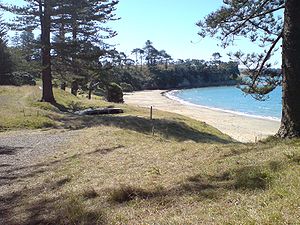Motuihe Island
| Maori: Te Motu-a-Ihenga | |
|---|---|

The beach on the northern side of the narrow western neck, separated from the southern beach by about 30 m (33 yd).
|
|

Location of Motuihe Island in the Hauraki Gulf.
|
|
| Geography | |
| Coordinates | 36°48′37″S 174°56′49″E / 36.810212°S 174.947019°E |
| Area | 179 ha (440 acres) |
| Administration | |
| Demographics | |
| Population | 1 |
Coordinates: 36°48′37″S 174°56′49″E / 36.810212°S 174.947019°E
Motuihe Island lies between Motutapu and Waiheke islands in the Hauraki Gulf of New Zealand, near Auckland. The island measures about 179 ha (440 acres), of which around 18 ha (44 acres) are remnants of coastal forest. The island is a recreation reserve controlled by the Department of Conservation (DOC) and administered by the Motuihe Trust. It is a popular spot for day trips, accessible by 30-minute ferry trip from Auckland, by seaplane, or by private boat. The island is known for its beautiful beaches.
The name comes from Te Motu-a-Ihenga, meaning 'Ihenga's Island' in Māori.
The small island has had a colourful human history. Starting out as a Māori settlement place, at least two pā fortification sites are known on the island. The locals are said to have grown gourds and taro. Very soon after arrival of the Europeans in the area, in 1839, the island was purchased, and farming began in the 1840s. Groves of Norfolk pines and olive trees are remnants of this time.
A quarantine station was built on the western section of the island in 1873. It was first used in 1874 for scarlet fever arriving on an inbound ship and operated for almost 50 years, slowly growing in size. During the First World War, the station was used as an internment camp whose most famous prisoner was Count Felix von Luckner and his crew of the commerce raider SMS Seeadler (Windjammer). Luckner organised an escape from the island in 1917, took over a scow and sailed to the Kermadec Islands where he was recaptured (and escaped again), though not before becoming something of an odd type of hero in the eyes of many New Zealanders, for the fact that his numerous and daring wartime escapades had killed only a single person.
...
Wikipedia
